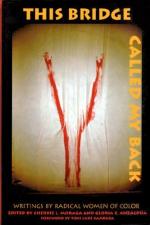
|
| Name: _________________________ | Period: ___________________ |
This test consists of 5 multiple choice questions, 5 short answer questions, and 10 short essay questions.
Multiple Choice Questions
1. What "problem" is addressed in the first section of the book?
(a) Writing problem.
(b) Gender problem.
(c) Success problem.
(d) Color problem.
2. What happened to the narrator in the poem "For the Color of My Mother" when she was two?
(a) She fell off of a roof.
(b) She broke her leg.
(c) She was attacked by a dog.
(d) She split her lip open.
3. What does "la guera" mean?
(a) White.
(b) Dark-skinned.
(c) Fair-skinned.
(d) Black.
4. When was "La Guera" written?
(a) January, 1990.
(b) September, 1979.
(c) October, 1963.
(d) July, 1956.
5. What taught Cherrie Moraga that "we are not human beings"?
(a) Her Chicana heritage.
(b) Her failure in school.
(c) Her lesbianism.
(d) Her oppression for being female.
Short Answer Questions
1. Where did the author of "La Guera's" mother work while lying about her age?
2. According to Rosario Morales, who is capable of being racist?
3. Who staffs the Buen Muir Indian Trading Post?
4. Who wrote "It's In My Blood, My Face- My mother's Voice, The Way I Sweat"?
5. Who did the subject from "on not bein" marry?
Short Essay Questions
1. What were Cherrie Moraga's and Gloria Anzaldua's hopes for the book?
2. According to Audre Lorde, what was the diversion task of black and third world women?
3. What did Doris Davenport describe as Black "wimmin's "aversion to white "wimmin"?
4. What questions did Anita Valerio discuss regarding the holy woman?
5. What is the common theme that all of the writings from the section titled "Introduction and Children Passing in the Streets: The Roots of Our Radicalism" have in common?
6. What did Aurora Levins Morales' friend Ceci say must change for things to be different so the daughters of Latinos could be free?
7. What did Cherrie Moraga state as the driving force behind compiling the book "This Bridge Called My Back"?
8. What are three of the ironic questionings that Lim makes regarding women in her poem "Wonder Woman"?
9. According to Emma Goldman from Cherrie Moraga's "La Guera," how must one gain a philosophy from any event?
10. Given that Judit Moschovich did not equate "American" with imperialistic and racist, what did she equate "American" with?
|
This section contains 921 words (approx. 4 pages at 300 words per page) |

|




